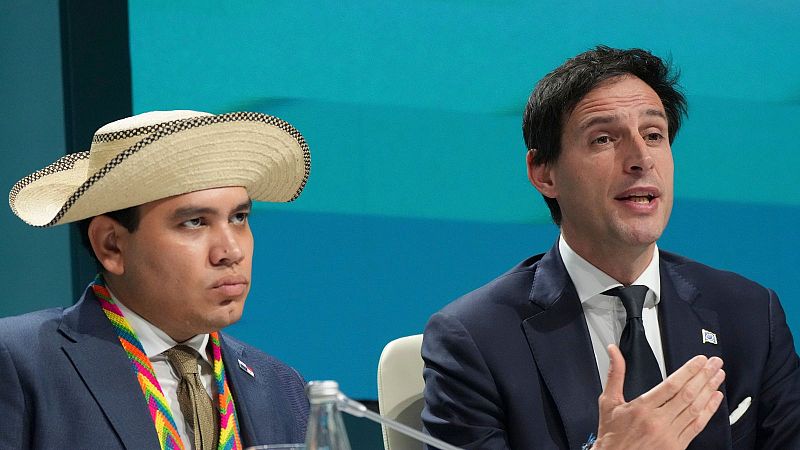'Clearly unacceptable': EU unconvinced by COP29 compromise climate finance proposal

A keenly-awaited draft agreement on climate finance was immediately deemed inadequate by EU negotiators at COP29 this morning, with campaigners also calling it an “illusion of progress”.
“As for the text overall, I’m not going to sugar coat it,” climate commissioner Wopke Hoekstra told reporters in Baku. “It is clearly unacceptable as it stands now.”
The head of the EU’s delegation to COP29 was speaking at a press conference alongside diplomats from Canada, Mexico, Norway and Switzerland, where countries were pledging to submit updated emissions reduction pledges in line with limiting temperature rise to 1.5 degrees by the February deadline.
The 10-page draft of an agreement on a ‘new collective quantified goal’ (NCQG) did not contain even a range of values for the headline goal, suggesting deadlock seen throughout the COP is yet to be broken.
Tasneem Essop, executive director of Climate Action Network International, said the compromise text was “glaringly incomplete” with the number left blank.
“Developed countries knew they were expected to arrive in Baku ready to agree on a meaningful climate finance goal,” Essop said. “They need to put the numbers on the table now, or we run the risk of not getting an outcome.”
The main blocs of developing economies have maintained from the start that they expect rich countries who have benefited from centuries of fossil-fuel-driven industrial growth to put at least a trillion dollars a year on the table – with a substantial core in the form of direct grants.
Azerbaijan, as president of what has been dubbed the ‘finance COP’, is keen to clinch a deal by the scheduled close of talks at 6pm local time on Friday (22 November). In a statement this morning, officials stressed the “substantially streamlined texts” it presented this morning were not final.
'Landing zones': How can COP29 bridge developed and developing countries' expectations?
“The COP29 Presidency’s door is always open, and we welcome any bridging proposals that the Parties wish to present,” it said.
“We are spending the day engaging with everyone.”
The presidency said it planned to release a revised text tonight, which would include “numbers based on our view of possible landing zones for consensus”.
“We are now in the endgame and we believe that a breakthrough in Baku is in sight,” the statement ran.
EU negotiators have consistently refused to be drawn on how much the bloc is willing to contribute to the new financing goal, which will replace from 2025 a current $100bn (around €95bn) that developed countries agreed on back in 2009.
Hoekstra did not respond when asked if he would be putting a number on the table today.
Although the response from climate activists on the ground in Baku has been overwhelmingly critical, some perceived signs of progress. Michael Jacobs is a professor of political economy at Sheffield University and a visiting fellow with the Overseas Development Institute, a think tank.
“This is a well-structured text which shows that considerable agreement has already been reached on key elements of the NCQG,” Jacobs said.
“Of course, the precise numbers are not yet there – but they were always going to be held back till the endgame.”
Where does the EU stand on the rest of the draft texts?
With the NCQG being only one – albeit the most important – of numerous policy strands that Azerbaijan wants to tie up during its COP presidency, Hoekstra himself acknowledged that things were moving in a positive direction in other areas, notably rules on carbon credits.
“Article 6 is one of the elements where at least the text is a bit encouraging,” Hoekstra said on the sidelines after the press conference.
He noted that the EU was pushing for “transparency, predictability, and credibility” of carbon credits – a system where one country can meet part of its emissions reduction contribution by paying another to deploy green energy or plant trees.
Overall however, the EU’s top climate official signalled that he wants to see significant changes before backing a final deal.
“If you look at the part on mitigation, it clearly did not do what we promised ourselves,” Hoekstra said – a reference to the agreement at last year’s COP in Dubai to “transition away” from fossil fuels. The intention this time was to enhance and operationalise the so-called UAE consensus, the said.
“This text is actually going in the opposite direction,” he said.
Yesterday

